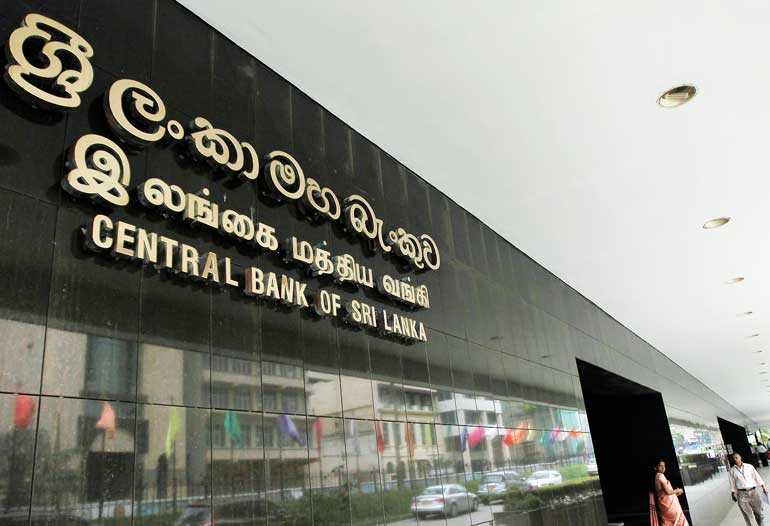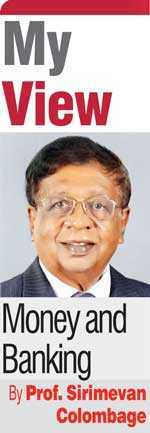Thursday Feb 19, 2026
Thursday Feb 19, 2026
Tuesday, 9 March 2021 02:10 - - {{hitsCtrl.values.hits}}

The CBSL is not yet ready to tackle the economy-wide challenges. Instead, its policy stance is confined more or less to offer piecemeal solutions to selected sectors, based on the old-fashioned credit rationing approach
 At its monthly Monetary Policy Review (MPR) meeting held last week, which was presided over by Governor Prof. W.D. Lakshman, the Central Bank of Sri Lanka (CBSL) announced that the policy interest rates will be kept at the same low level considering the lack of demand-driven inflationary pressures.
At its monthly Monetary Policy Review (MPR) meeting held last week, which was presided over by Governor Prof. W.D. Lakshman, the Central Bank of Sri Lanka (CBSL) announced that the policy interest rates will be kept at the same low level considering the lack of demand-driven inflationary pressures.
Unquestionably, the country has been facing unprecedented economic difficulties emanating from the COVID-19 pandemic. In this background, it is quite challenging for the CBSL not only to provide monetary stimulus to revive the pandemic-hit economy under political pressure, but also to address the longstanding economic imbalances facing the country.
Low interest rates and rupee strengthening
At the MPR meeting, the officials emphasised CBSL’s commitment to keep interest rates down and to avoid exchange rate depreciation. The CBSL expressed its firm intention to maintain these two crucial rates within the desirable ranges, rather than leaving them to be determined by free market forces. It was mentioned that “guided yield rates” are given prior to Treasury bill auctions. The need for strengthening the rupee was also emphasised.
But it is not viable to fix both the exchange rate and interest rates by CBSL at the same time without allowing capital outflows, in terms the theorem of “policy trilemma” or “impossible trinity”, as I pointed out in an earlier article appeared in Daily FT (http://www.ft.lk/columns/Policy-trilemma-poses-formidable-challenges-to-interest-and-exchange-rate-management/4-713226).
Industry-level solutions impracticable
The CBSL is not yet ready to tackle the economy-wide challenges. Instead, its policy stance is confined more or less to offer piecemeal solutions to selected sectors, based on the old-fashioned credit rationing approach. While noting the slowdown in commercial bank credit disbursements to the private sector, the need to direct bank lending to productive sectors was stressed. It was revealed that the necessary regulations are being formulated by CBSL to direct credit to the priority sectors.
The Governor indicated that he had a series of successful meetings with the stakeholders of different sectors including apparel, tea, rubber, coconut, gem and jewellery and IT to identify industry-specific challenges.
While the financial difficulties faced by such sectors amidst the pandemic cannot be underestimated, there does not seem to be any necessity for the CBSL to intervene at micro-level, as there are a plenty of dedicated government organisations such as the Tea Board, Board of Investment, Export Development Board, Tourism Board, etc. to deal with such industry-specific challenges.
Moreover, it is not practicable for the CBSL to deal with each and every industry without discrimination. Much greater responsibility entrusted to the CBSL, as the apex financial body, is to ensure macroeconomic stability so as to facilitate smooth functioning of business activities of different sectors.
Politics and economics mixed up
The CBSL still does not want to recognise the gravity of economic problems facing the country. Instead, the Governor has repeatedly branded the critics as purveyors of ‘doom and gloom’, as vividly elaborated by my former colleague, Dr. W.A. Wijewardena in his Daily FT column (http://www.ft.lk/columns/Critics-failing-to-understand-alternative-strategy-are-purveyors--of--doom-and-gloom---CB-Governor/4-713149).
At a recent webinar organised by a new research initiative called ‘Veemansa’, the Governor went to the extreme of relating the adverse comments made by the critics to the ongoing UNHRC conference in Geneva, which has hardly anything to do with Sri Lanka’s economic issues. This reflects the extent of mixing up politics with economics.
Alternative development model yet to be unveiled
The Governor has reiterated in several public forums during the past couple of weeks that the Government is adopting an alternative economic development model that deviates from mainstream economics.
This alternative model is yet to be unveiled. Bits and pieces of the new model seem to include import restrictions, less-flexible exchange rate, non-engagement with IMF, non-adoption of structural reforms, less dependence on foreign debt and increased reliance on domestic borrowings.
Most of these policy measures were fashionable more or less during the pre-liberalisation period, and they proved to be unsuccessful to a large extent in Sri Lanka, as in the case of many developing countries.
Excessive bank financing of budget deficit downplayed
At the MPR meeting, CBSL officials seem to have downplayed the major economic challenges facing Sri Lanka – excessive bank financing of the budget deficit, balance of payments difficulties, foreign debt burden, capital outflows, slow economic growth, underlying inflationary pressures – which are bound to exert severe economic difficulties in weeks to come.
The MPR made no reference (apart from the numbers appearing in an annexed Table) to excessive financing of the budget deficit through bank credit, which is the root cause of many of the current economic ills. Net bank credit to the Government rose by as much as 63% in January this year on Y-o-Y basis, and credit to public corporations rose by 29%.
In contrast, bank credit to the private sector rose only 6.9% on Y-o-Y basis. Thus, monetary easing has not helped much to reactivate the private sector during the pandemic, as envisaged by CBSL. Of course, the CBSL cannot be blamed for slow private sector credit growth, as factors affecting such credit are beyond its control.
Largely as a result of the increased credit to the public sector, the money supply rose by 24% in January this year on Y-o-Y basis. CBSL claims that such high money supply growth is warranted to meet the government debt obligations as long as inflation is subdued. It was noted that demand-driven inflationary pressures have not emerged, as the country’s actual output is less than its potential.
Nevertheless, the underlying inflationary pressures as reflected in alternative price indicators such as the Producer Price Index need to be recognised.
Operating environment of banks weakening
Heavy credit disbursement to the public sector by banks, particularly the state-owned Bank of Ceylon and People’s Bank, has led to deteriorate the operating environment of the banking sector, according to a recent report by the rating agency Fitch.
It notes that the two banks have greater risk exposure than the private banks, given their high loan-book concentration and unsustainable balance sheet expansion.
Question on money printing unanswered
At the MPR meeting, a question raised from the audience to clarify the quantity of money printed by CBSL was left answered.
The CBSL has not responded to the critics who continuously alleged that truckloads of money were printed in recent months. In the circumstances, I had to point out on behalf of CBSL that the actual amount of money printed was much less than the exorbitant numbers quoted by the critics (http://www.ft.lk/columns/Budgetary-pressures--restrict-monetary-policy-space/4-713978).
The reason being that the net outflow of foreign reserves and decline in other domestic assets siphoned-off the impact of CBSL’s substantial purchases of Treasury Bills on new currency issues.
Shying away from IMF
The country is facing severe balance of payments difficulties in the backdrop of the shortfalls in earnings from exports and tourism. World-wide, worker remittances are expected to go down by 20% this year. The projected rise in crude oil prices in the coming weeks is likely to aggravate foreign exchange difficulties. To make matters worse, Sri Lanka has to meet external debt commitments over $ 5 billion this year.
As claimed by CBSL, it is a fact that Sri Lanka has an unblemished record of honouring her debt obligations. Nonetheless, foreign debt commitments exert considerable burden on the balance of payments.
Given the above difficulties, it would be appropriate to have a stand-by arrangement with the International Monetary Fund (IMF) to overcome the balance of payments difficulties and to ease the debt burden, as I reiterated in these columns earlier. That would have improved the country’s sovereign debt ratings paving the way to obtain foreign credit with favourable terms and conditions.
It would also provide opportunity rectify the macroeconomic imbalances with stipulated deadlines. However, such arrangement is unlikely to take place in the near future, according to official announcements.
Import substitution creates anti-export bias
The Government’s preferred policy option to face the balance of payments difficulties appears to be import substitution (IS) strategy. This strategy was in vogue across developing countries in the 1950s and 1960s. IS policies, however, ran out of steam in the 1970s and 1980s mainly due to their adverse implications for the export sector and economic activity.
The renowned Argentine economist, Raúl Prebisch, who pioneered in popularising IS strategy among developing countries in the 1950s, had this to say in 1959, “… in some cases indiscriminate or massive protection has gone far beyond the optimum point, to the serious detriment of exports and world trade.”
In Sri Lanka, IS strategy was experimented from time to time since the latter half of 1950s without much success. Imports were restricted by using import bans and quotas, exchange controls, import duties and non-tariff barriers during the periods of 1957-1967 and 1970-1977. This strategy has been adopted in different forms even during the post-liberalisation era since 1977 obstructing export-oriented growth.
Recognising the shortcomings of IS strategy long ago, the CBSL’s Annual Report of 1964 stated, “… there is certainly little room left for further curtailment of imports without affecting production and development activities adversely.”
A major disadvantage of IS strategy is its tendency to create anti-bias environment due to exchange rate over-valuation, price distortions, black markets, corruption and shortage of raw materials and equipment.
CBSL at receiving end of directives
The Parliament Committee on Public Finance is reported to have directed the CBSL officials last week to come up with an innovative strategic plan that works in the interest of the public. It is also reported that the CBSL was advised not to act like state or commercial banks which are profit and ratings oriented.
The Committee Chairman is reported to have advised that the Monetary Board should fulfill its responsibilities properly, and that maintaining financial discipline is a fundamental factor for any country.
CBSL officials were directed to submit a report on new development strategies to the Committee which prioritise the uplifting of local entrepreneurs.
It is rather amusing why CBSL was advised in such manner, contrary to its objectives and functions laid down in the Monetary Law Act. The CBSL needs to clarify such complexities before succumbing to such seemingly irregular directives.
CBSL to act as economic advisor to Government
Instead of being at the receiving end of directives, the CBSL, as an autonomous body by statute, needs to urge the Government to improve fiscal discipline by eliminating its dependence on bank credit to finance the budget deficit, which is the root cause of current macroeconomic imbalances.
It may be recalled here that the former CBSL Governor Dr. Indrajit Coomaraswamy ably assisted by his Deputy, Dr. Nandalal Weerasinghe initiated such path by tying up monetary policy with an inflation-targeting framework so as to strengthen independent monetary policy operations.
The economic situation has become worse since then due to COVID-19 pandemic, and therefore, it might be unfair to criticise the CBSL for non-application of strict monetary rules during these difficult times. Nevertheless, still there is room to apply the monetary rules with some flexibility, instead of permitting discretionary monetary expansion to accommodate excessive fiscal needs.
(Prof. Sirimevan Colombage is Emeritus Professor in Economics at the Open University of Sri Lanka and Senior Visiting Fellow of the Advocata Institute. He is a former Director of Statistics of the Central Bank of Sri Lanka, and reachable through [email protected])